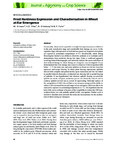Frost hardiness expression and characterisation in wheat at ear emergence
| dc.contributor.author | Al-Issawi, M | |
| dc.contributor.author | Rihan, H Z, | |
| dc.contributor.author | El-Sarkassy, N, | |
| dc.contributor.author | Fuller, MP, | |
| dc.date.accessioned | 2013-01-28T13:59:23Z | |
| dc.date.available | 2013-01-28T13:59:23Z | |
| dc.date.issued | 2013-02-01 | |
| dc.identifier.issn | 0931-2250 | |
| dc.identifier.issn | 1439-037X | |
| dc.identifier.uri | http://hdl.handle.net/10026.1/1263 | |
| dc.description.abstract |
Occasionally, wheat can be exposed to overnight freezing temperatures whilst it is in the early reproductive stage and considerable frost damage can occur. In the vegetative stage, full expression of frost tolerance genes can be gained when plants are exposed to acclimation temperatures (4 °C). Paradoxically, wheat during flowering has limited or no ability to effectively acclimate or re-acclimate and it demonstrates frost sensitivity during this stage. Using a combined approach involving infrared thermography and molecular analysis, the causes and effects of frost-induced damage to wheat during ear emergence were investigated. It was demonstrated that frost damage only occurs to wheat ears if the temperature falls below -5 °C but some ears, and some spikelets on frozen ears do not freeze but supercool and escape freezing. In whole plant freezing experiments, spikelets showed both complete and partial sterility upon maturation and this was linked to parallel infrared observation of detached ears showing full or partial freezing of spikelets. It was hypothesised that wherever spikelet freezing occurred the spikelet was sterile and grain production per ear was drastically reduced, and in contrary, spikelet survival was as a result of supercooling. Molecular analysis of the upregulation of Cbf14 showed that as ear emergence progressed the ability to induce Cbf14 decreased but at early stages of ear emergence Cbf14 was able to be induced by exposure to acclimating temperatures (4 °C). The hypothesis that the lack of the ear to acclimate is because of the incapability to induce the CBF transcription factor was only partially upheld in this investigation. Further work is needed to elucidate more precisely the molecular incompetency for the acclimation of wheat during ear emergence. © 2012 Blackwell Verlag GmbH. | |
| dc.format.extent | 66-74 | |
| dc.language | en | |
| dc.language.iso | en | |
| dc.publisher | Wiley | |
| dc.subject | acclimation | |
| dc.subject | anthesis | |
| dc.subject | Cbf gene | |
| dc.subject | frost tolerance | |
| dc.subject | supercooling | |
| dc.subject | wheat | |
| dc.title | Frost hardiness expression and characterisation in wheat at ear emergence | |
| dc.type | journal-article | |
| dc.type | Article | |
| plymouth.author-url | https://www.webofscience.com/api/gateway?GWVersion=2&SrcApp=PARTNER_APP&SrcAuth=LinksAMR&KeyUT=WOS:000313725000008&DestLinkType=FullRecord&DestApp=ALL_WOS&UsrCustomerID=11bb513d99f797142bcfeffcc58ea008 | |
| plymouth.issue | 1 | |
| plymouth.volume | 199 | |
| plymouth.publication-status | Published | |
| plymouth.journal | Journal of Agronomy and Crop Science. | |
| dc.identifier.doi | 10.1111/j.1439-037X.2012.00524.x | |
| plymouth.organisational-group | /Plymouth | |
| plymouth.organisational-group | /Plymouth/Faculty of Science and Engineering | |
| plymouth.organisational-group | /Plymouth/Faculty of Science and Engineering/School of Biological and Marine Sciences | |
| plymouth.organisational-group | /Plymouth/REF 2021 Researchers by UoA | |
| plymouth.organisational-group | /Plymouth/REF 2021 Researchers by UoA/UoA06 Agriculture, Veterinary and Food Science | |
| plymouth.organisational-group | /Plymouth/Users by role | |
| plymouth.organisational-group | /Plymouth/Users by role/Academics | |
| dc.identifier.eissn | 1439-037X | |
| dc.rights.embargoperiod | Not known | |
| rioxxterms.versionofrecord | 10.1111/j.1439-037X.2012.00524.x | |
| rioxxterms.licenseref.uri | http://www.rioxx.net/licenses/all-rights-reserved | |
| rioxxterms.type | Journal Article/Review |


